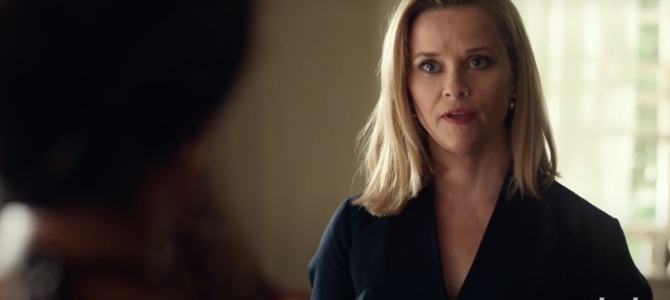
Reese Witherspoon and Kerry Washington face off as the opposite kind of mom in Hulu’s new “Little Fires Everywhere,” a series based on the popular book by Celeste Ng. The two women’s lives intersect in the small, idyllic, town of Shaker, Ohio.
One mother is drawn to Shaker for the good school district, while the other has been there her entire life, and her legacy comes with power and influence. While the show is about race relations and the blossoming of identity politics in the 1990s, it’s also a deep exploration of motherhood, and what it means to be part of a family.
In Shaker, where a private school education comes at public school prices, there is one prominent ethos: those who live there are primarily “good people” who try to do the right thing, and really believe that by following their best intentions they are helping others. What they can’t see is that helping people, and helping people assimilate to your lifestyle and expectations, are two different things. That only matters, of course, when an outsider comes onto the scene.
Witherspoon plays Elena, the perfect mom. Seeing Elena try to navigate her need to be correct and in line with social norms is really stressful. Washington plays Mia, the artsy, single mom who is loaded with more secrets than her old blue Chevy hatchback can carry. Both live on a razor’s edge, struggling to maintain a balance between what is expected of them and what they can do without breaking. Those definitions, for Mia and Elena, couldn’t be more different, but the way they handle them—with lies, secrets, and a fear of truth—couldn’t be more similar.
Elena has always believed herself to be one of the good people. She feels that she is charitable, fun, generous. She has always done what she is expected to do, from the time she was a little girl doing as her affluent family wanted to growing up, marrying a lawyer, and raising four children in a gorgeous home. What she wanted to do—travel the world for love, pursue a career in journalism—was set aside in order to attain these other goals.
Mia took an opposite tack. Her family, too, had rigid expectations, but she broke every last one of them, and became an artist. What keeps her locked in a prison of her own making are her secrets. Her connection with her daughter, Pearl (Lexi Underwood), is deep, thoroughly heart-to-heart, but Pearl is in the dark about not only her mother’s past but her own. Her desires for what she feels are normal teenage life, from homecoming to first boyfriends, outweigh what her mother wants for her as well.
The story begins in the late 1990s, but it jumps around in time for flashback scenes that give viewers an understanding of Elena and Mia, and how they became the women and mothers they are. It’s interesting to see the ’90s reflected from this distance of more than 20 years. Conversations about affirmative action and racially exclusive clubs were in full swing, and the term microaggression had not yet cut its way through the mulchy earth of racial discourse. Saying “pardon me, do you have any Grey Poupon,” mimicking the popular commercial of the time, got big laughs back then.
Adoption was big, both cross-culturally and cross-racially. Blended families, and social acceptance thereof, were considerable talking points. In “Little Fires Everywhere,” these things play a large role in the story and elucidate the differences in worldview between Mia and Elena. Does blood legitimize a mother, or is there something behavioral about motherhood? Is love all it takes to be a good mother, or does money matter? As our culture strives to provide an equality of opportunity for children, the question of what is best comes up in a variety of scenarios.
Witherspoon’s perfect-but-breaking-inside wealthy upper-class white woman with a reputation for perfection to uphold is pitch perfect. She has an OCD-style sex schedule with her husband, from which she will not deviate. She has four kids and wants them all to be pretty and popular. Her career gives her life, that extra layer of meaning, so she feels like more than the culture tells her she is.
The streams of each characters’ life, both the moms and their combined children, are shot in a really personal and intimate way. It can be jarring to experience this, anxiety-producing to feel empathy for all the characters on screen equally. Each is laid bare, shown without pretense. Scenes are all shot with intensity and mostly in close-ups. Long shots, even just from down the end of the hall, are rare. This is a mark of incredible directing by Lynn Shelton, who directed the bulk of the season. She died recently, at the young age of 54, from an undiagnosed blood disorder.
“Little Fires Everywhere” begins and ends with a house on fire. The season shows us the end, takes us back to the beginning, then brings us back to the end. This is much the way Mia and Elena each work through their personal narratives and history of choices to arrive at the same place.
Elena, catching up with an old beau, tells him: “I wanted to know what your life looked like. If you were happy with the life you chose, or. It’s like one day you wake up and it’s settled, you are who you are, and you don’t remember how it got that way, you don’t remember deciding. It just happened. I just wonder if you ever look back at your life and have regrets. Because I do, I have some regrets.”
Perhaps it’s because of these regrets that the truth is revealed when Mia says to Elena, “You can’t stand it that someone would choose a different life than you.” It’s not that Elena can’t stand it, it’s that she never understood that she had a choice to make. Elena thought all her choices were made for her.
In an early 1980s flashback, we see Mia driving with a young Pearl in the backseat. In 1983 we didn’t know any better, so the kids sat up front. It’s amazing how we can assume that our current practices are how they have always been. They are not.
This mistake is something of a metaphor for the entire series. We think we know ourselves, we think we understand how race relations work, what it means to be a mother, how to make a family. We think we’re following a strict path, when we’re really choosing.
We are choosing all the time. Every action, whether we think it through or not, is a choice. And it is not a given. Nothing we’ve done has been done before. There is no prescription. How we live is up to us.









